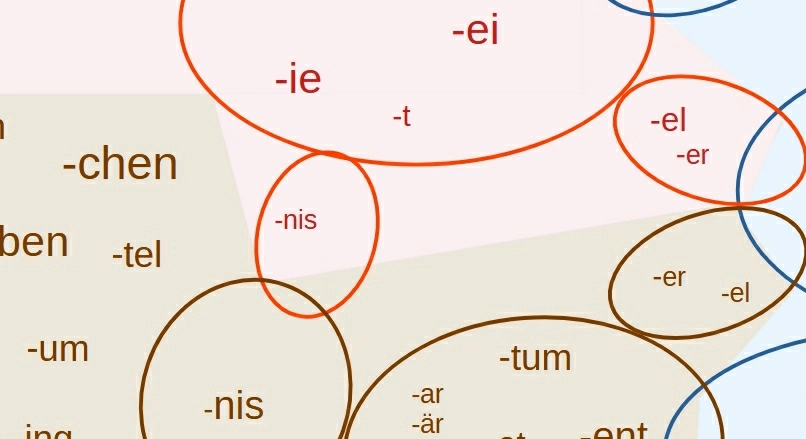Last Updated on October 2, 2024
In the last part of the topic devoted to gender in the German language, we will consider the neuter gender.
Other parts:
1. Plural, declension, and gender in German. Feminine gender
2. Plural, declension, and gender in German. Masculine gender
4. Tests for Gender and Plural in German
Sentences with zu in German
Verbs with prepositions in German. Preposition um and preposition über
Modal verbs in German
Past tense in German. Perfect and preterite
Separable verbs in German
SS or ß in German
From horror to anxiety: fürchten, Angst haben, erschrecken, bangen, entsetzen
Reach an agreement: vereinbaren vs verabreden, ausmachen etc.
Fahrstuhl or Aufzug or Lift and others
Neuter gender in German
Neuter words by meaning
Colours
Here it is neuter both in meaning and in form (substantivized adjective).
das Rot
das Blau…
Domestic animals and cubs
Most of the general and most commonly used words for domestic animals are of the neuter gender. This, naturally, does not apply to words denoting a specific sex of these animals. The exception is dog, cat, donkey and goat, to which, apparently, there is no indifferent “middle” attitude.
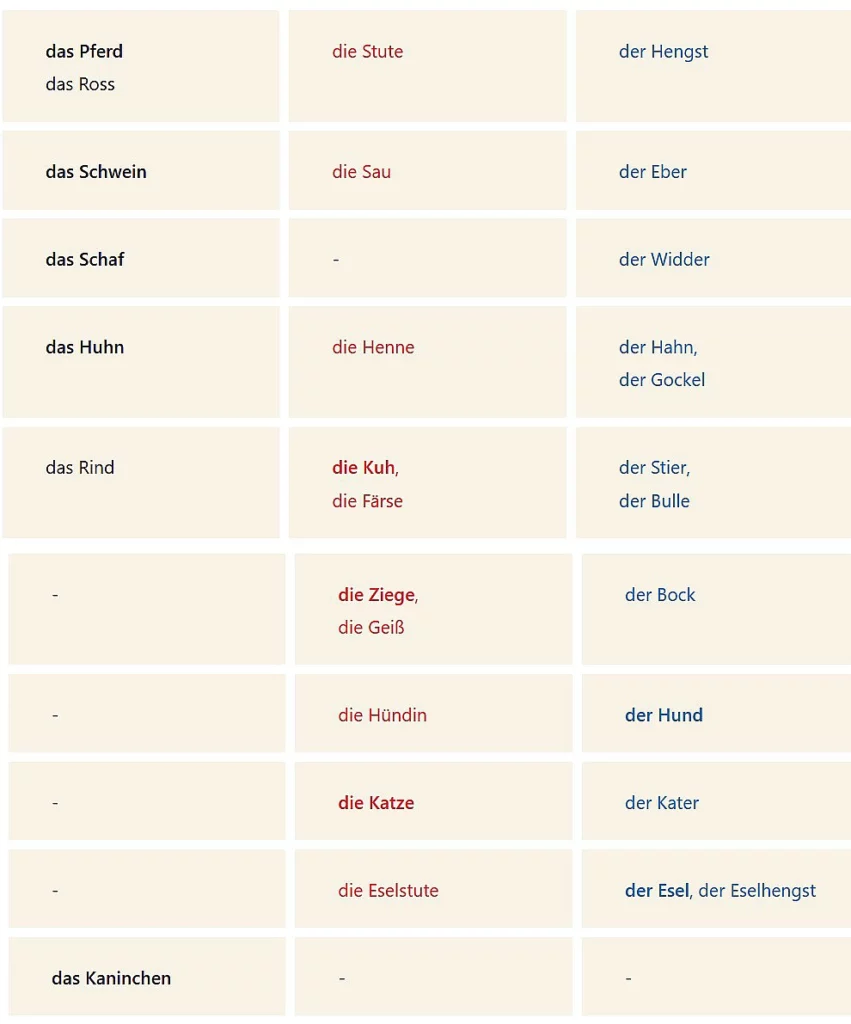
Cubs are also neuter. The exception is the puppy – der Welpe.
das Baby
das Kind
das Fohlen
das Ferkel
das Lamm
das Küken
das Kalb
das Geißlein, das Kitz
das Kätzchen
Metals
Words denoting metals are neuter. Exceptions: die Bronze, der Nickel, der Stahl.
das Eisen
das Kupfer
das Zink
das Messing
das Gold
das Silber
das Blei
das Titan
das Aluminium
das Chrom…
Continents, countries, cities
Countries, continents and cities formally belong to the neuter gender, but are used without an article.
Exceptions:
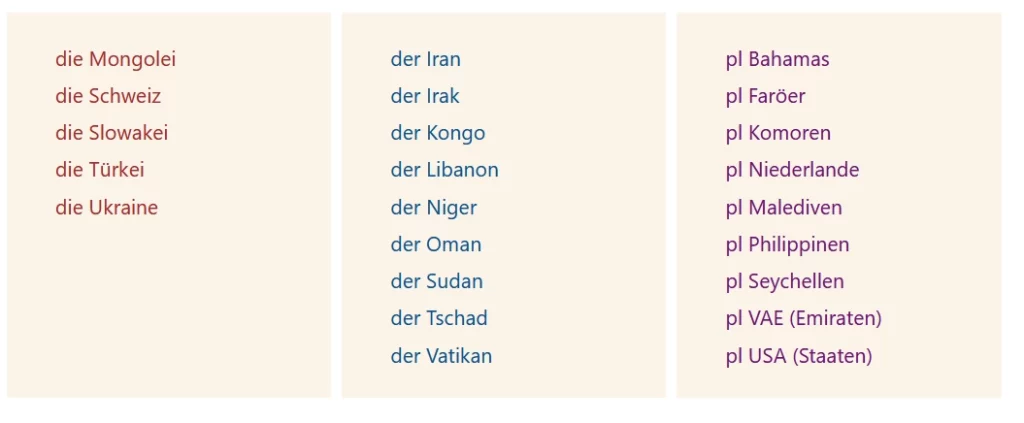
Languages, letters, notes
The names of languages, letters and notes are of the neuter gender.
das Deutsch
das Englisch
das Hindi
das B
Public facilities
Hier there are a little more neuter words, but also too many exceptions, which makes this feature questionable.
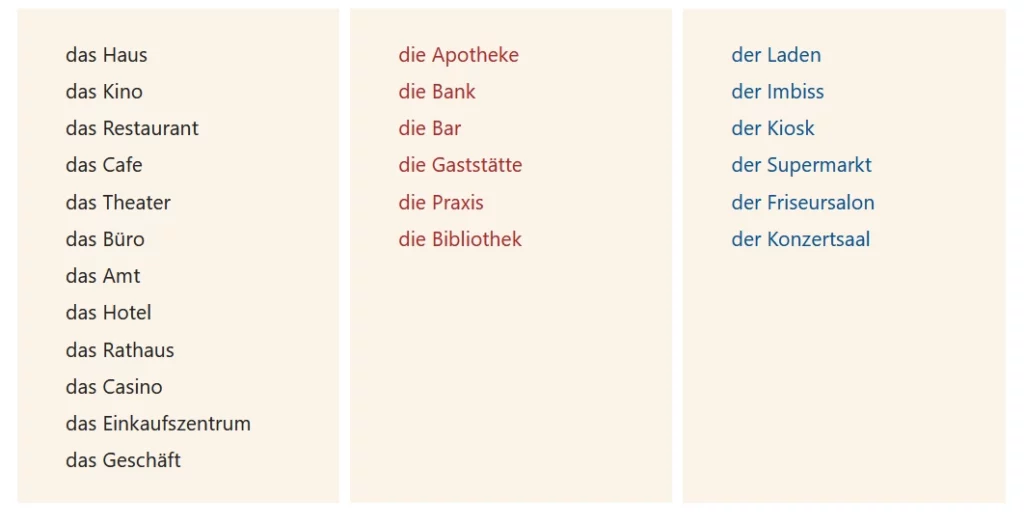
Words of the neuter gender by form
If you don’t see the image, turn on ads and cookies.
Substantivized verbs and adjectives
One of the most convenient signs: substantivized verbs (ending in -en) and substantivized adjectives (rare) are neuter. Sometimes a whole expression turns into a noun and it will also be neuter: das Vergissmeinnicht.
das Aussehen
das Essen
das Lachen
das Leben
das Verhalten
das Versprechen
das Wandern…
das Leid
das Hoch
das Rund
Ge… (e)
Ge– is a typical beginning of a neuter word in German. There are exceptions, but they are few, and they often fall out of the pattern, so you’ll find them easy to remember.
Words in Ge- have the following meanings:
– collective
– typical activity
– result of action
If you see Ge– and a verb stem without -en after it, or Ge- and a noun stem with a general meaning, you can be pretty sure the word is neuter.

Words, ending in -nis
Most words ending in -nis are neuter.
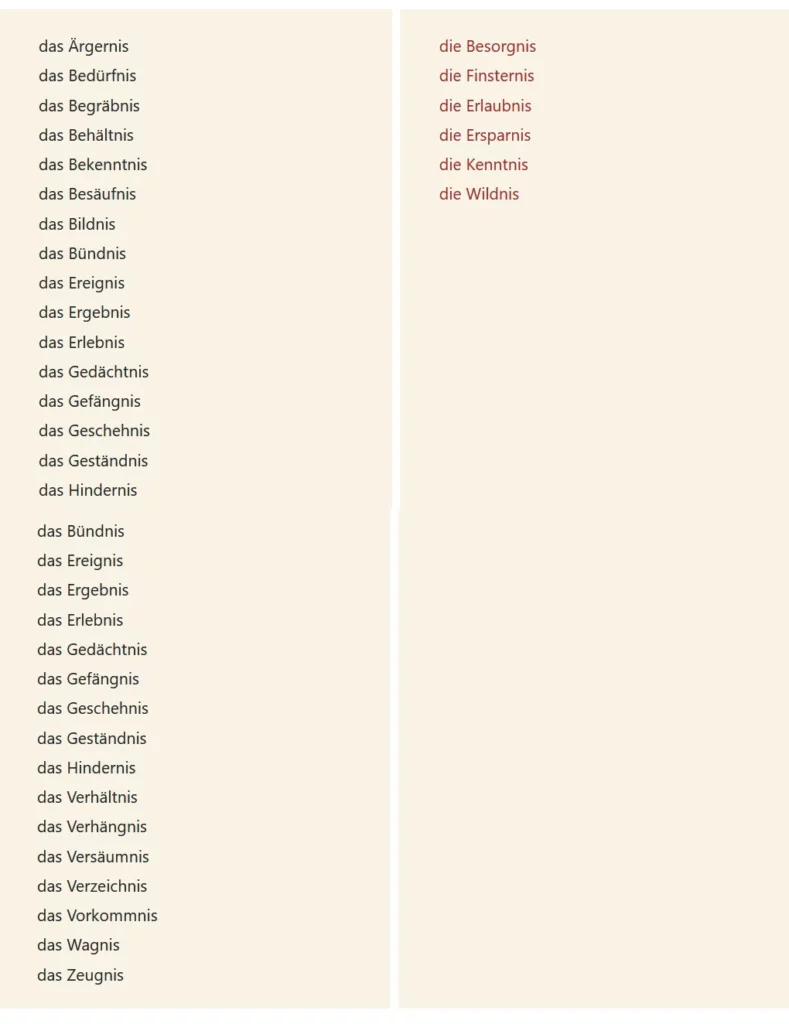
Words, ending in -tum
Words ending in -tum mean:
quality
action
collective or state.
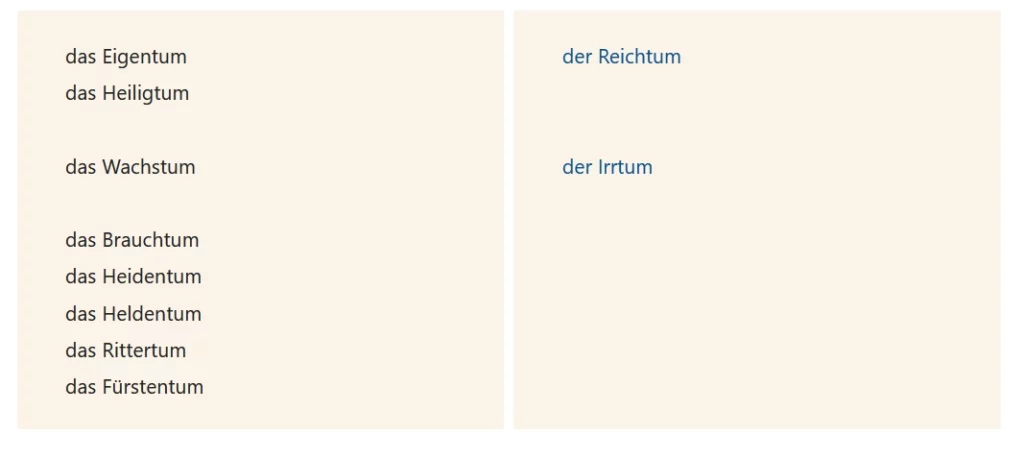
Words, ending in -lein, -chen
Diminutive suffixes, often affectionate rather than derogatory. While -lein is more likely to be found in fairy tales, -chen is a very active suffix. Sometimes the original word is no longer used (as in Märchen).
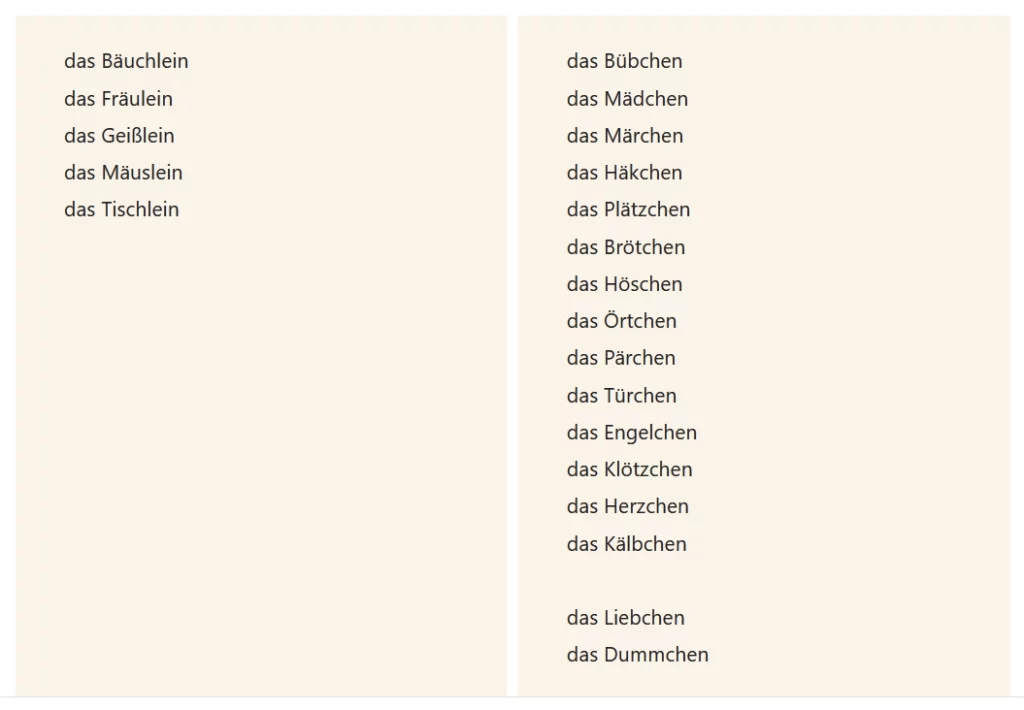
Words, ending in -tel
Means part of a whole.
das Viertel
das Drittel
das Achtel
das Hundertstel…
Loanwords
The neuter gender has its own suffixes, which they do not share with anyone, and there are those that also belong to the masculine gender.
In the masculine gender, we have considered a whole series of suffixes where there was a note “mainly if it refers to people, otherwise, as a rule, neuter gender”. Let us now list them from the point of view of neuter gender.
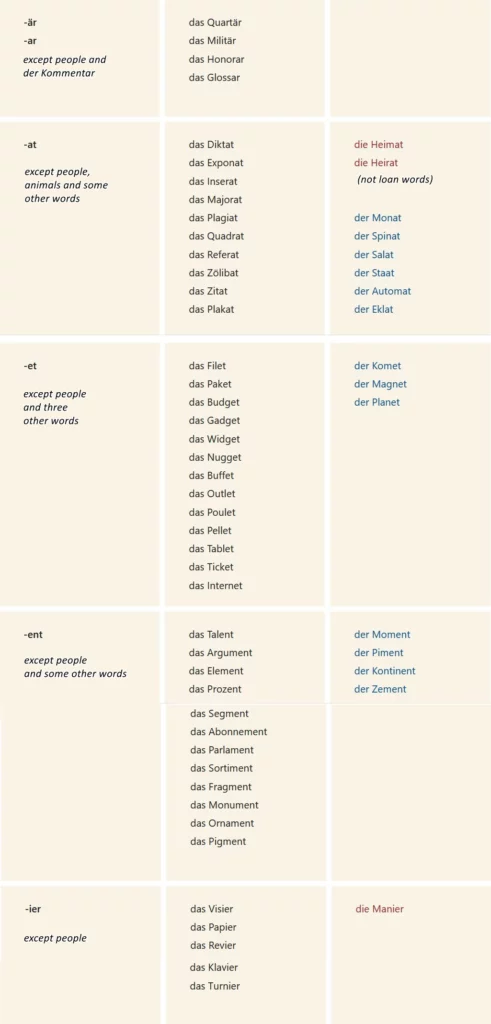
Words, ending in -ing
das Curling
das Bowling
das Banking
das Billing
das Styling
das Tuning
das Recycling
das Parking
das Outing
Words, ending in -um
das Album
das Arboretum
das Datum
das Depositum
das Museum
das Stadium
das Studium
das Zentrum…
Words, ending in -ma
The suffix -ma comes from old Greek, denotes various scientific concepts, often medical. All these words are neuter. The exception is die Firma – a coincidence in form, this word comes from Italian.
das Drama
das Karma
das Klima
das Komma
das Thema
das Asthma
das Trauma
das Dilemma
das Panorama
das Plasma…
Neuter gender declension
Words of the neuter gender have the ending -(e)s in the genitive singular.
Words ending in -e, -er, -el or zero in the plural also add the ending -(e)n in the dative plural. Words ending in -s in the plural do not add this ending.
Gen Singular
des Endes
des Bild(e)s
des Messers
des Möbels
des Cafes
Dat Plural
die Enden
die Bildern
die Messern
die Möbeln
die Cafes
Mixed declension
The only word of the neuter gender belongs to the mixed declension – das Herz.
Nom Sing.
Gen Sing.
Dat Sing.
Akk Sing.
Herz
Herzens
Herz(en)
Herz(en)
Nom Plural
Gen Plural
Dat Plural
Akk Plural
Herzen
Herzen
Herzen
Herzen
Plural neuter
Basic ending of the plural of the neuter gender – -er.
If you don’t see the image, turn on ads and cookies.
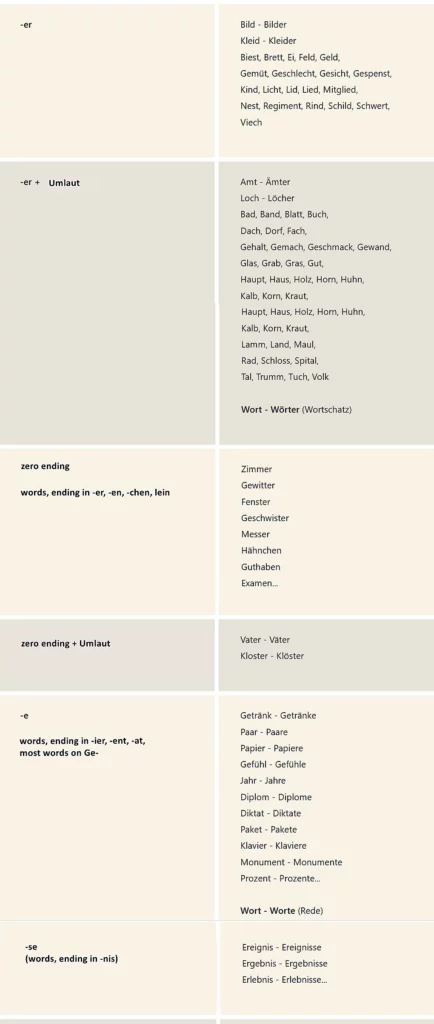

1. Plural, declension, and gender in German. Feminine gender
2. Plural, declension, and gender in German. Masculine gender
Tests for Gender and Plural in German
Sentences with zu in German
Verbs with prepositions in German. Preposition um and preposition über
Modal verbs in German
Past tense in German. Perfect and preterite
Separable verbs in German
SS or ß in German
From horror to anxiety: fürchten, Angst haben, erschrecken, bangen, entsetzen
Reach an agreement: vereinbaren vs verabreden, ausmachen etc.
Fahrstuhl or Aufzug or Lift and others
Do you enjoy the site without cookies and maybe without ads? This means that I work for you at my own expense.
Perhaps you would like to support my work here.
Or Cookie settings change: round sign bottom left

